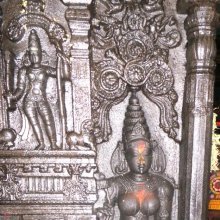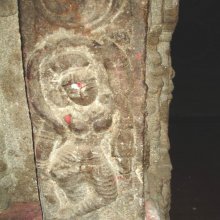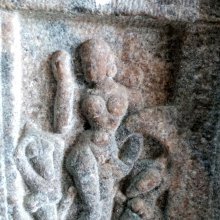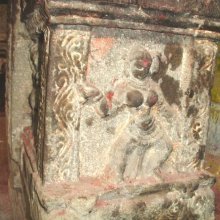Avadhuta, Avadhūta, Avadhūtā: 22 definitions
Introduction:
Avadhuta means something in Hinduism, Sanskrit, Marathi, Hindi. If you want to know the exact meaning, history, etymology or English translation of this term then check out the descriptions on this page. Add your comment or reference to a book if you want to contribute to this summary article.
Alternative spellings of this word include Avadhut.
Images (photo gallery)
In Hinduism
Natyashastra (theatrics and dramaturgy)
Source: Wisdom Library: Nāṭya-śāstraAvadhuta (अवधुत) refers to one of the thirteen gestures of the Head: one of the six major limbs (aṅga) used to perform certain gestures (āṅgika), according to the Nāṭyaśāstra chapter 8.—Instructions: When the head is once turned down it is called the Avadhuta. (Uses): it is to be applied in [communicating] a message involking a deity, conversation and beckoning [one to come near]. (See the Nāṭyaśāstra 8-23)
Source: archive.org: The mirror of gesture (abhinaya-darpana)One of the Twenty-four Heads. Avadhuta: inclining the head sharply. Usage: saying “Stay”, pointing out a place, asking a question, summoning, conversation.
Source: Shodhganga: Elements of Art and Architecture in the Trtiyakhanda of the Visnudharmottarapurana (natya)Avadhuta (अवधुत) refers to one of the seven movements of the head” (in Sanskrit Dramas), as conveyed through Āṅgikābhinaya: one of the four divisions of Abhinaya or “ways to convey or represent one’s emotion to others”, according to the Viṣṇudharmottarapurāṇa, an ancient Sanskrit text which (being encyclopedic in nature) deals with a variety of cultural topics such as arts, architecture, music, grammar and astronomy.—The āṅgikābhinaya includes the histrionic representation of the limbs which is simply known as physical gestures. In the Viṣṇudharmottarapurāṇa, seven types of movements of the head are recorded. The Avadhuta movement indicates messages, conversation etc.

Natyashastra (नाट्यशास्त्र, nāṭyaśāstra) refers to both the ancient Indian tradition (shastra) of performing arts, (natya—theatrics, drama, dance, music), as well as the name of a Sanskrit work dealing with these subjects. It also teaches the rules for composing Dramatic plays (nataka), construction and performance of Theater, and Poetic works (kavya).
Purana and Itihasa (epic history)
Source: archive.org: Shiva Purana - English TranslationAvadhūta (अवधूत) refers to one who is “unsullied”, according to the Śivapurāṇa 2.2.16. Accordingly as Brahmā narrated to Nārada:—“[...] On hearing these words of mine—of Brahmā—in the presence of Viṣṇu, Śiva, the lord of worlds spoke to me with his face beaming with a smile: [...] Of what avail is a beloved to me in this world since I am in the path of abstinence delighting myself in my own soul, freed of attachment, unsullied (avadhūta), with the body of an ascetic, possessed of knowledge, seeing himself, free from aberrations and a non-reveller. Besides I am always unclean and inauspicious. Hence say now what can I do with a loving wife?”.
Source: Cologne Digital Sanskrit Dictionaries: The Purana IndexAvadhūta (अवधूत).—The friend who accompanied Purañjana to the Saurabha kingdom, through the entrances Nalini and Nālini.1 Allegorically sense of smell.2 Taught spiritual wisdom to Yadu.3

The Purana (पुराण, purāṇas) refers to Sanskrit literature preserving ancient India’s vast cultural history, including historical legends, religious ceremonies, various arts and sciences. The eighteen mahapuranas total over 400,000 shlokas (metrical couplets) and date to at least several centuries BCE.
Vedanta (school of philosophy)
Source: Shodhganga: Siva Gita A Critical StudyAvadhūta (अवधूत) or Avadhūtagītā refers to one of the sixty-four Gītās commonly referred to in Hindu scriptures.—Gītā is the name given to certain sacred writings in verse (often in the form of a dialogue) which are devoted to the exposition of particular religious and theosophical doctrines. Most of these Gītās [i.e., Avadhūta-gītā] originate from the Mahābhārata or the various Purāṇas.

Vedanta (वेदान्त, vedānta) refers to a school of orthodox Hindu philosophy (astika), drawing its subject-matter from the Upanishads. There are a number of sub-schools of Vedanta, however all of them expound on the basic teaching of the ultimate reality (brahman) and liberation (moksha) of the individual soul (atman).
Shaktism (Shakta philosophy)
Source: Google Books: ManthanabhairavatantramAvadhūta (अवधूत) refers to a “renouncer”, according to the second recension of the Yogakhaṇḍa of the Manthānabhairavatantra, a vast sprawling work that belongs to a corpus of Tantric texts concerned with the worship of the goddess Kubjikā.—Accordingly, as the Goddess (i.e., Khageśī) said to the God (i.e., Bhairava), “[...] Being one who has matted hair, shaved head, (having a) topknot, carrying a skull, smeared with ashes or wearing the five insignias—O god, (none of this) leads to accomplishment in the Kula tradition. (Even) a renouncer [i.e., Avadhūta] who does not bear the five insignias and is naked does not quickly achieve success in the western (transmission) of the House of the Yoginīs. This is forbidden and (so) all this is absent in the Kaula (teachings). O Maheśvara, as this is improper how can the Command be given to you?”.

Shakta (शाक्त, śākta) or Shaktism (śāktism) represents a tradition of Hinduism where the Goddess (Devi) is revered and worshipped. Shakta literature includes a range of scriptures, including various Agamas and Tantras, although its roots may be traced back to the Vedas.
Shaivism (Shaiva philosophy)
Source: Brill: Śaivism and the Tantric TraditionsAvadhūtā (अवधूता) refers to the “stainless/unblemished one” and is used to describe the Goddess, according to the Brahmayāmala-tantra (or Picumata), an early 7th century Śaiva text consisting of twelve-thousand verses.—Virtually all ritual begins with the instruction to enter into a state of meditative concentration, called nirācāra, and to take on a body of śakti, called the avadhūtatanu. Śiva is the nirācārapada, “the state beyond regulated conduct”, while the Goddess is avadhūtā, “the stainless/unblemished one”.

Shaiva (शैव, śaiva) or Shaivism (śaivism) represents a tradition of Hinduism worshiping Shiva as the supreme being. Closely related to Shaktism, Shaiva literature includes a range of scriptures, including Tantras, while the root of this tradition may be traced back to the ancient Vedas.
Languages of India and abroad
Marathi-English dictionary
Source: DDSA: The Molesworth Marathi and English Dictionaryavadhūta (अवधूत).—m (In Sanskrit, Rejected, removed, agitated, cast away: also virakta or Separated from sensuous or carnal affections.) A Brahman-avatar of dattātrēya q. v. He was a great wanderer. Hence, A term for an individual of an order of viraktabrāhmaṇa or gōsāvī who roam about in nudity reciting avadhūtagītā a metrical piece found in the bhāgavata purāṇa. Compounds are avadhūta-pantha-mārga-sampra- dāya-caritra-dīkṣā. The order or ways of the avadhūta roamers; and fig. Non-distinction of castes and general pollution and profligacy. For avadhūtadattātrēya See dattātrēya. In poetry, also avadhūtamūrtti. Ex. sakaḷa brahmāṇḍīñcīṃ dēvatēṃ dhāvati || avadhūtamūrtti pāhāvayā ||.
Source: DDSA: The Aryabhusan school dictionary, Marathi-Englishavadhūta (अवधूत).—m dattātrēya. One who does not observe the distinction of castes &c. a Naked.
Marathi is an Indo-European language having over 70 million native speakers people in (predominantly) Maharashtra India. Marathi, like many other Indo-Aryan languages, evolved from early forms of Prakrit, which itself is a subset of Sanskrit, one of the most ancient languages of the world.
Sanskrit dictionary
Source: DDSA: The practical Sanskrit-English dictionaryAvadhūta (अवधूत).—p. p.
1) Shaken, waved. Mālatīmādhava (Bombay) 9.18.
2) Discarded, rejected, despised; R.19.43.
3) Insulted, humiliated. हृतदारोऽवधूतश्च नाहं जीवितमुत्सहे (hṛtadāro'vadhūtaśca nāhaṃ jīvitamutsahe) Mahābhārata (Bombay) 3.282.36.
4) Excelled, surpassed; लीलावधूतपद्मा कथयन्ती पक्षपातमधिकं नः (līlāvadhūtapadmā kathayantī pakṣapātamadhikaṃ naḥ) Ratnāvalī 2.8.
5) Attacked, overcome.
6) Separated from worldly attachments.
-taḥ An ascetic who has renounced all worldly attachments and connections; यो विलङ्घ्याश्रमान्वर्णानात्मन्येव स्थितः पुमान् । अतिवर्णाश्रमी योगी अवधूतः स उच्यते (yo vilaṅghyāśramānvarṇānātmanyeva sthitaḥ pumān | ativarṇāśramī yogī avadhūtaḥ sa ucyate) || or अक्षरत्वात् वरेण्यत्वात् धूतसंसारबन्ध- नात् । तत्त्वमस्यर्थसिद्धत्वादवधूतोऽभिधीयते ॥ सदाप्लुतोऽधःशयनोऽवधूतः (akṣaratvāt vareṇyatvāt dhūtasaṃsārabandha- nāt | tattvamasyarthasiddhatvādavadhūto'bhidhīyate || sadāpluto'dhaḥśayano'vadhūtaḥ) Bhāgavata 3.1.19. अवधूतोपेक्षिते च कम्पिते चाश्रमान्तरे (avadhūtopekṣite ca kampite cāśramāntare) | Nm.
2) Smelling sense, nose, नलिनी नालिनी च प्राग्द्वारावेकत्र निर्मिते । अवधूतसखस्ताभ्यां विषयं याति सौरभम् (nalinī nālinī ca prāgdvārāvekatra nirmite | avadhūtasakhastābhyāṃ viṣayaṃ yāti saurabham) || Bhāgavata 4.25.48.
Source: Cologne Digital Sanskrit Dictionaries: Edgerton Buddhist Hybrid Sanskrit DictionaryAvadhūta (अवधूत).—(compare [Boehtlingk and Roth] 5.1527, dhū with ava, ppp., glossed malina), in a list of evil (magic) powers and influences: Mahā-Māyūrī 220.19; 245.19; 259.13. Not in the similar list Mahāvyutpatti 4372—87.
Source: Cologne Digital Sanskrit Dictionaries: Shabda-Sagara Sanskrit-English DictionaryAvadhūta (अवधूत).—mfn.
(-taḥ-tā-taṃ) 1. Compelled. 2. Discarded. 3. Shaken, removed, tossed. 4. Trodden upon. 5. Separated from worldly feeling and obligation. E. ava, and dhūta shaken.
Source: Cologne Digital Sanskrit Dictionaries: Cappeller Sanskrit-English DictionaryAvadhūta (अवधूत).—[adjective] shaken off, removed, rejected, sparned, tossed, trodden upon, unclean.
Source: Cologne Digital Sanskrit Dictionaries: Aufrecht Catalogus Catalogorum1) Avadhūta (अवधूत) as mentioned in Aufrecht’s Catalogus Catalogorum:—poet. [Subhāshitāvali by Vallabhadeva]
2) Avadhūta (अवधूत):—Bhagavadbhaktistotra. Report. Xxxi.
Source: Cologne Digital Sanskrit Dictionaries: Monier-Williams Sanskrit-English Dictionary1) Avadhūta (अवधूत):—[=ava-dhūta] [from ava-dhū] mfn. shaken off (as evil spirits), [Vājasaneyi-saṃhitā i, 14]
2) [v.s. ...] removed, shaken away, [Bhāgavata-purāṇa] etc.
3) [v.s. ...] discarded, expelled, excluded, [Mahābhārata] etc.
4) [v.s. ...] disregarded, neglected, rejected, [Daśakumāra-carita] etc.
5) [v.s. ...] touched, [Rāmāyaṇa vi, 82, 62]
6) [v.s. ...] shaken, agitated (especially as plants or the dust by the wind), fanned, [Mahābhārata] etc.
7) [v.s. ...] that upon which anything unclean has been shaken out or off (cf. avakṣuta), [Manu-smṛti v, 125; Mahābhārata xiii, 1577]
8) [v.s. ...] unclean, [Bhāgavata-purāṇa]
9) [v.s. ...] one who has shaken, off from himself worldly feeling and obligation, a philosopher (brahma-vid), [Bhāgavata-purāṇa; Rājataraṅgiṇī]
10) [v.s. ...] m. Name of a Śaiva philosopher
11) [v.s. ...] n. rejecting, repudiating, [Mahābhārata iv, 352] (= [Harivaṃśa 4717]).
Source: Cologne Digital Sanskrit Dictionaries: Yates Sanskrit-English DictionaryAvadhūta (अवधूत):—[ava-dhūta] (taḥ-tā-taṃ) p. Shaken off.
Source: DDSA: Paia-sadda-mahannavo; a comprehensive Prakrit Hindi dictionary (S)Avadhūta (अवधूत) in the Sanskrit language is related to the Prakrit words: Avadhūya, Avahūya, Odhūa, Ohūya.
[Sanskrit to German]
Sanskrit, also spelled संस्कृतम् (saṃskṛtam), is an ancient language of India commonly seen as the grandmother of the Indo-European language family (even English!). Closely allied with Prakrit and Pali, Sanskrit is more exhaustive in both grammar and terms and has the most extensive collection of literature in the world, greatly surpassing its sister-languages Greek and Latin.
Hindi dictionary
Source: DDSA: A practical Hindi-English dictionaryAvadhūta (अवधूत) [Also spelled avadhut]:—(nm) a (peculiar type of) religious mendicant; (a) rough and rugged (man).
...
Kannada-English dictionary
Source: Alar: Kannada-English corpusAvadhūta (ಅವಧೂತ):—[adjective] shaken off; removed; discarded; rejected.
--- OR ---
Avadhūta (ಅವಧೂತ):—
1) [noun] one who has shaken himself off from worldly feeling and obligation; an ascetic of highest order; an absolute philosopher.
2) [noun] (dance.) a lowering of the head once to indicate concealed thoughts, invoking, asking to one stay or stop etc.
Kannada is a Dravidian language (as opposed to the Indo-European language family) mainly spoken in the southwestern region of India.
See also (Relevant definitions)
Starts with: Avadhutadevadatta, Avadhutagita, Avadhutagrantha, Avadhutamarga, Avadhutanubhuti, Avadhutapada, Avadhutapranipata, Avadhutarama, Avadhutarupa, Avadhutarya, Avadhutashatka, Avadhutashrama, Avadhutastotra, Avadhutatantra, Avadhutatanu, Avadhutavesha, Avadhutayogilakshana, Avadhutopanishad.
Ends with: Caitanyagiri avadhuta, Guptavadhuta, Krishnavadhuta, Kulavadhuta, Lilavadhuta, Viryavadhuta, Viryyavadhuta, Vyaktavadhuta, Vyavadhuta.
Full-text (+61): Avadhutavesha, Avadhutapranipata, Avadhut, Avatutam, Avadhutashrama, Vyavadhuta, Mantrin, Avatutan, Adharashakti, Odhua, Avahuya, Bhagavadbhaktistotra, Avadhuya, Caitanyagiri avadhuta, Ohuya, Viryavadhuta, Viryyavadhuta, Saurabha, Sri Parnananda Tirtha, Twenty-four Heads.
Relevant text
Search found 31 books and stories containing Avadhuta, Avadhūta, Ava-dhuta, Avadhūtā, Ava-dhūta, Ava-dhūtā; (plurals include: Avadhutas, Avadhūtas, dhutas, Avadhūtās, dhūtas, dhūtās). You can also click to the full overview containing English textual excerpts. Below are direct links for the most relevant articles:
Chaitanya Bhagavata (by Bhumipati Dāsa)
Verse 2.3.125 < [Chapter 3 - The Lord Manifests His Varāha Form in the House of Murāri and Meets with Nityānanda]
Verse 3.5.379 < [Chapter 5 - The Pastimes of Nityānanda]
Verse 3.5.642 < [Chapter 5 - The Pastimes of Nityānanda]
Manusmriti with the Commentary of Medhatithi (by Ganganatha Jha)
Verse 5.123 < [Section XIII - Purification of Substances]
Concept of Oneness in the Upanishads (study) (by Chandra Shekhar Upadhyaya)
Classification of the Upaniṣad < [Chapter 1 - Introduction]
Abhinaya-darpana (English) (by Ananda Coomaraswamy)
Rudra-Shiva concept (Study) (by Maumita Bhattacharjee)
30. Avadhūteśvara manifestation < [Chapter 5 - Rudra-Śiva in the Purāṇic Literature]
43. Origin of Śiva-liṅga < [Chapter 5 - Rudra-Śiva in the Purāṇic Literature]
Thirty minor Upanishads (by K. Narayanasvami Aiyar)
Related products





